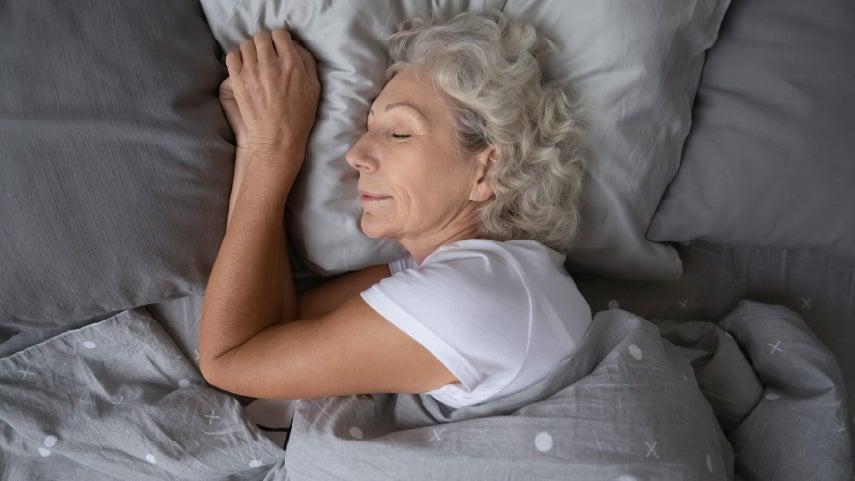
Related Topics
There’s nothing quite like waking up feeling alert, refreshed, and ready to take on the day. But as we age, a good night’s sleep may not come as easily as it did in our younger years. And that’s a problem. Persistent poor sleep not only impacts our energy levels and ability to think and focus; it also affects our mental health, memory, and cognition. It may even increase our risk for developing depression.
Below, we explore the link between sleep and depression and how improving your sleep can boost your emotional well-being. If you've been struggling with either of these things, you're not alone—and there are ways to get relief.
What is depression?
Depression is a mental health disorder characterized by persistent feelings of sadness, hopelessness, and a lack of interest in activities that once brought pleasure. Before diagnosing a person with major depression, health care providers typically look for symptoms to be present for at least two weeks.
“Depression is more than just feeling sad or having a tough day—it’s a serious mood disorder that profoundly affects how you feel, think, perceive, and participate in the world around you,” explains Kathleen Cameron, former Senior Director of the NCOA Center for Healthy Aging. “For some older adults, depression feels like a constant heavy fog that makes even the simplest everyday tasks seem overwhelming.”
Major depression is one of the most common mental illnesses, affecting about 22.5 million adults in the U.S.1 According to the Centers for Disease Control and Prevention (CDC), roughly 4% of adults age 70 and over suffer from depression. It’s more common in those with limited daily functioning, certain medical conditions (e.g., heart disease), and sleep problems.2
What are the symptoms of depression in older adults?
Everyone experiences depression differently. However, common signs and symptoms include:
- Constant feelings of sadness, emptiness, or hopelessness
- Changes in appetite or weight
- Trouble sleeping or sleeping too much
- Fatigue or loss of energy
- Trouble concentrating or remembering things
- Restlessness or irritability
Depression can also lead to thoughts of suicide or self-harm. If you or someone you know is exhibiting suicidal thoughts, dial or text 988 to be connected to the Suicide & Crisis Lifeline.
How are depression and sleep connected?
Depression and sleep are closely connected, and this link is bidirectional, meaning it works both ways. People with insomnia (trouble falling asleep and/or staying asleep) may be 10 times more likely to develop depression than people who sleep well. And, among those who have depression, 75% struggle with insomnia.3
What’s the reason for this bidirectional relationship? Depression often disrupts sleep, leading to issues like insomnia, restless sleep, or sleeping too much—and this can worsen fatigue and emotional imbalance. On the other hand, ongoing poor sleep can increase the risk of developing depression (or worsen existing symptoms). This is because the brain and body don’t get the restorative rest needed for emotional regulation and optimal cognitive function.
To sum it all up: Lack of quality sleep can intensify depression, and depression can make it harder to sleep well. This creates a relentless cycle that can be tough to break without the right treatment and support.
What are common sleep disorders associated with depression?
Several known sleep disorders appear to go hand in hand with depression. These include:
- Insomnia: When you have insomnia, you might have trouble falling asleep, staying asleep, or sleeping soundly. This can lead to daytime effects like tiredness, issues concentrating, and increased risk of falling.
- Hypersomnia: This term refers to excessive sleep or sleepiness during waking hours.
- Sleep apnea: A person with sleep apnea briefly stops breathing at various intervals while sleeping. It may be caused by a blockage in the airway (obstructive sleep apnea) or it may be due to malfunctions in the part of the brain that controls sleep (central sleep apnea).
All of these disorders can cause daytime exhaustion and sleepiness, disruptions in daily functioning, cognitive issues, and mood changes.
10 tips for sleeping better with depression
Depression is not a sign of weakness or something you can just snap out of. It’s a real health condition, like diabetes or arthritis, that can affect anyone, at any age. If you’re having depressive symptoms, talk to your health care provider about what you can do to feel better. Effective treatments for depression include cognitive behavioral therapy (CBT), medication, or a combination of both.
In addition to seeking expert guidance, there are practical strategies that can help you optimize your sleep and keep your depression symptoms in check:
- Limit caffeine and alcohol: Caffeine can keep you awake for several hours after consuming it. And while alcoholic beverages can initially be sedating, they can disrupt your sleep later in the night. Avoid or restrict these substances, particularly in the late afternoon and evening. If you are taking a medication for depression, your doctor may recommend that you avoid alcohol.
- Add more physical activity to your day: Exercise can help improve your sleep quality by easing stress and anxiety. Try to get at least 30 minutes of moderate exercise daily—but avoid high-intensity workouts close to bedtime as they can make you feel more energized.
- Get outside: Being out in the sunlight is a natural spirit-booster. It also helps your body produce vitamin D, which helps enhance mood. What’s more, sun exposure can also support our natural circadian rhythms, which are responsible for regulating sleep and other essential body functions. While in the sun, protect yourself. Don’t forget sunscreen and a hat! If you're not able to get outside and as a general practice, keep your home bright by opening the blinds or shades in the early morning and keep them open until bedtime.
- Actively manage your stress levels: Negative thoughts and feelings can wreak havoc with our sleep. Try journaling, meditation, yoga, or talking to a trusted friend or therapist to help you better manage upsetting thoughts and “de-clutter” your mind.
- Set a consistent sleep schedule: It sounds simple, but our bodies crave routine. Go to bed and wake up at the same time each day (even on weekends). A firm schedule helps regulate your body's internal clock, making it easier for you to fall asleep and wake up naturally. The recommended number of hours of sleep for older adults is 7 to 9, according to the National Institute on Aging.4
Naps can be a pick me up during the day. Try to keep your naps limited to early afternoon, such as after lunch. Avoid long naps (30 minutes or more) in the late afternoon or evening. - Limit screen time before bed: Did you know the invisible blue light emitted by your smartphone, tablet, or laptop can interfere with your body’s melatonin production, making it harder to fall asleep? That’s why you should put away the screens at least 30 minutes before bedtime.
- Create a soothing nighttime routine: A warm soak in the tub or some easy-listening music right before bed sends a signal to your body that it’s time to relax, wind down, and prepare for slumber.
- Maintain a sleep-friendly bedroom: Make sure it’s cool, dark, and quiet. Earplugs, a white-noise machine, and blackout curtains can help create a non-stimulating environment that fosters easy sleep. To play it safe, install motion sensor lights that go on in your bedroom when you have to get up in the middle of the night.
- Invest in the best mattress for you: The right mattress can significantly improve your sleep quality by providing proper support and comfort to reduce pressure points, ease pain, and promote better spinal alignment. It can also help regulate your body’s temperature to help you stay cool and comfortable in any season.
People with certain health conditions may also need an adjustable bed so they can sleep in an elevated position. Adjustable beds may improve symptoms associated with breathing, back pain, and acid reflux by elevating the head and/or feet to open airways and reduce pressure on certain parts of the body, ultimately leading to a better night's sleep. - Talk to a sleep specialist: If your sleep problems persist despite your best efforts, talk to your primary care doctor for a referral to a sleep medicine specialist. Conditions like insomnia or sleep apnea may need a thorough assessment and more targeted treatment beyond behavior and lifestyle changes.
The bottom line
Your sleep and mental health are deeply interconnected, and taking purposeful steps to improve one of these areas can often lead to improvements in the other. As Cameron explains, “Start by making small changes to your daily routine and see how they affect your sleep. And don’t hesitate to ask for professional help if you need it. Prioritizing our rest is not a luxury… it’s a very critical part of taking care of ourselves as we age.”
Sources
1. Mental Health America. Quick Facts and Statistics About Mental Health. Found on the internet at https://mhanational.org/mentalhealthfacts
2. Centers for Disease Control and Prevention (CDC). Depression and Aging. Found on the internet at https://www.cdc.gov/healthy-aging/about/depression-aging.html
3. Johns Hopkins Medicine. Depression and Sleep: Understanding the Connection. Found on the internet at https://www.hopkinsmedicine.org/health/wellness-and-prevention/depression-and-sleep-understanding-the-connection
4. National Institute on Aging. Sleep. Found on the internet at https://www.nia.nih.gov/health/sleep



